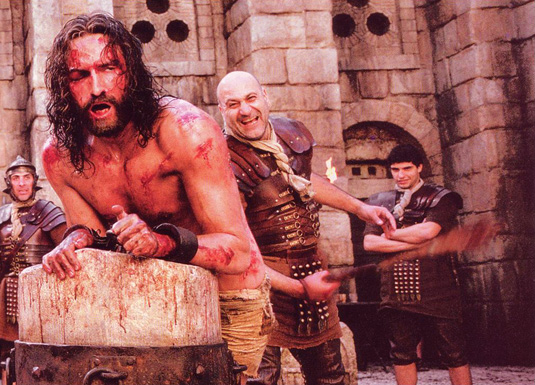Just yesterday, I presented a message on the end of Luke 18 where Jesus heals a blind man along the road just outside of Jericho. The man had heard the commotion of Jesus’ entourage and asked as to the reason for the uproar. Some at the front of the procession inform him that it’s because Jesus of Nazareth was passing that way. In response, he begins to shout, “Jesus, Son of David, have mercy on me!”

What was it that made this beggar associate Jesus with David?
Jewish people in the first century were awaiting the coming of a great king that would be the true successor to David according to a promise made in 2 Samuel 7:12-16:
When your days are over and you rest with your ancestors, I will raise up your offspring to succeed you, your own flesh and blood, and I will establish his kingdom. He is the one who will build a house for my Name, and I will establish the throne of his kingdom forever. I will be his father, and he will be my son. When he does wrong, I will punish him with a rod wielded by men, with floggings inflicted by human hands. But my love will never be taken away from him, as I took it away from Saul, whom I removed from before you. Your house and your kingdom will endure forever before me; your throne will be established forever. – 2 Samuel 7:12-16
As we continue through the narrative, it would be easy to conclude that Solomon and his gilded reign were the fulfillment of this promise, but the Jews of Jesus’ day didn’t see it that way mostly because they were no longer a sovereign kingdom ruled by a Davidic monarch. What about that whole, “establish forever” thing?
Christians believe that the blind man in Luke 18 was correct about Jesus’ identity. Let’s consider each of the traits of the Son of David from this promise in an attempt to see what he saw:
- He would be “raised up” after the death of David.
According to 1 Kings 1:43-48, David himself made Solomon king on his throne while David was still alive. The successive descendants of David obviously came to power after David’s death, but none of them could be said to have been “raised up,” since they all started at the top.
Isaiah predicted that Messiah would grow up before God like a shoot out of dry ground (Is. 53:2).
According to the gospels, Jesus rose from and earthy existence in a blue collar backwater to divinely endorsed rabbi. Then, he rose from corpse to king.
- He will be David’s physical descendant.
Solomon and all the others including Jesus met this criteria. This part of the promised coupled with the previous part begs the question, “From David’s vantage point, why would his physical descendant need to be raised up?” It would need to happen after the chain of earthly succession had been broken.
The Son of David must be a physical descendant born after Israel’s defeat and captivity.
- I will establish his kingdom forever.
We might understand this to mean that the one to come would always have descendants on his throne, but wouldn’t that be superfluous? With Solomon excluded as the fulfillment, why would David care which as yet unborn descendant sat on his throne or to which other random descendant it was passed next?
The one to come will not have to relinquish the kingdom because he will never die. His throne will be established because he won’t ever have to vacate it.

- He is the one to build a house for my name.
Yes, Solomon built the temple, but we’ve already excluded him as the ultimate fulfillment of this promise. If the promised descendant isn’t Solomon, then the house to be built isn’t the temple.
Jesus told his disciples, “I will build my church.” (Matthew 16:18) We think of church as a building, so Jesus’ words don’t sound strange to us, but the word for “church” literally means, ” a called out group of people.” Jesus intentionally wove two images together to express the sort of house he came to build for God. In the context of Matthew 16, Jesus told Peter that he would be the first stone in an edifice made up of called out people.
Peter perpetuated the imagery he received from Christ as he wrote to those who like him had been installed in God’s house,
As you come to him, the living Stone —rejected by humans but chosen by God and precious to him—you also, like living stones, are being built into a spiritual house to be a holy priesthood, offering spiritual sacrifices acceptable to God through Jesus Christ. – 1 Peter 2:4-5
- The relationship between the one to come and God will be son to father – that is, one of loving discipline and unconditional love.
This one always struck a sour note with me. “When he does wrong”? Has Jesus done wrong? Does he need discipline for his own affronts to God or offenses against people?

It struck me (no pun intended) today that this promise speaks to the union we have with Christ. At his passion, he was literally struck with “a rod wielded by men, with floggings inflicted by human hands.” We know that wasn’t because of wrongs he himself had done, but wrongs for which he took the blame. Christ has so committed himself to his own people that their sins have become his wrongs. But, this fatherly chastisement didn’t end with the cross.
When Jesus appears to Saul of Tarsus on the Damascus Rd., he asked, “Why are you persecuting me?” (Acts 9:4). The author of the letter to the Hebrews encourages them to face persecution because through the hands of men God disciplines them like a father (Hebrews 12:7-11).

In Christ, the promises to David convey to us. We are the sons of David. We have come into God’s kingdom not as subjects, but as sons – co regents and co heirs with Christ. In our enduring hardships, God continues to fulfill his promise to train his son, the son of David. Persecution is as much our birthright as is a seat at God’s table or our future possession of all creation. Unlike Christ at his passion, we never suffer alone because he continues to be persecuted with his church. Why must we suffer persecution? Because we continue to do wrong. We’ll never be condemned for those wrongs, but we must learn to desist from them.
Peter describes the blessed fruit of suffering with Christ in these words,
Therefore, since Christ suffered in his body, arm yourselves also with the same attitude, because whoever suffers in the body is done with sin. As a result, they do not live the rest of their earthly lives for evil human desires, but rather for the will of God. – 1 Peter 4:1-2
God’s promise through Samuel can only be fulfilled through one person who has ever lived. Because of what he suffered, he can include all people in that promise since his suffering was for their wrongs. In Christ, we are sons of God and sons of David. Our suffering on his behalf certifies our claim on the throne.
Now if we are children, then we are heirs—heirs of God and co-heirs with Christ, if indeed we share in his sufferings in order that we may also share in his glory. -Romans 8:17
